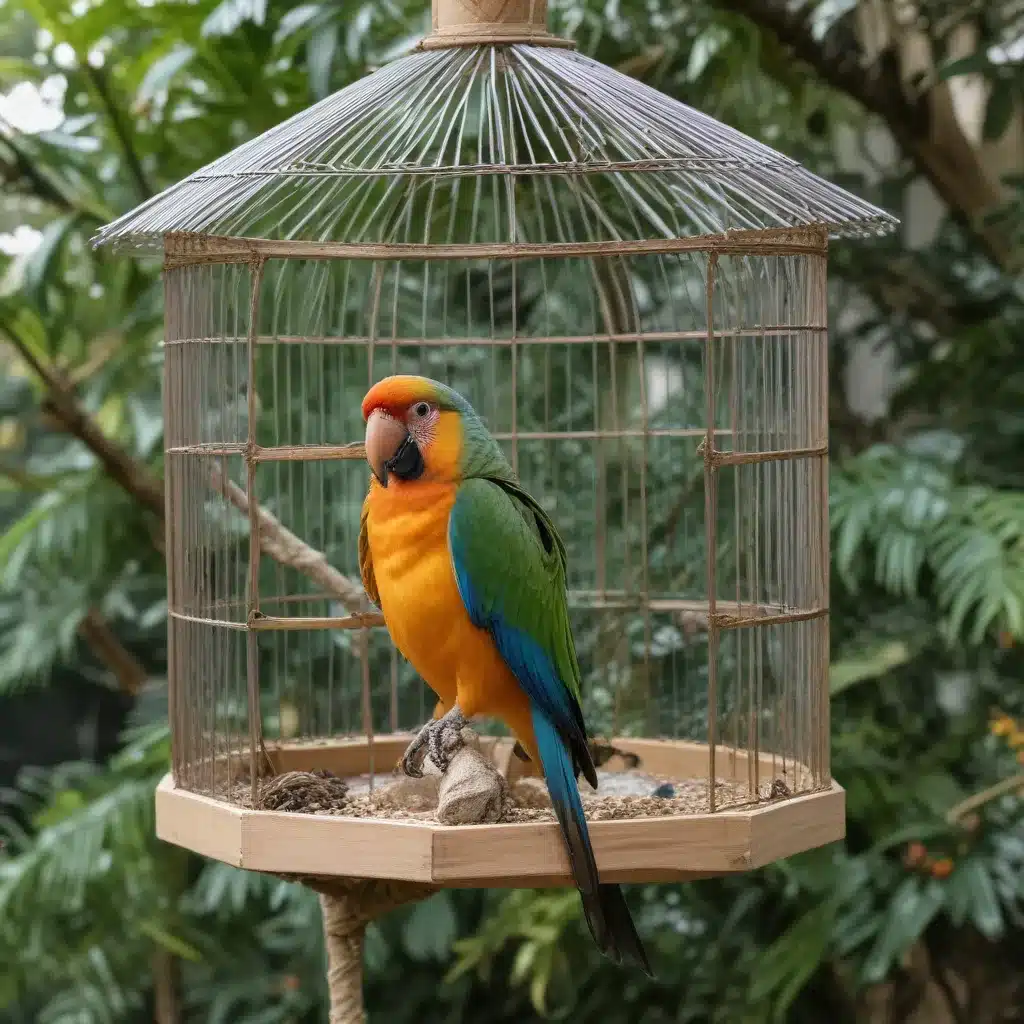
Aviary Adaptations: Modifying Your Home to Accommodate the Needs of Exotic Birds
As an experienced avian caretaker, I’ve had the pleasure of working with a wide variety of fascinating bird species – from colorful parrots and finches to majestic raptors. One of the most rewarding aspects of this field is helping bird owners create enriching, comfortable habitats that cater to their feathered companions’ unique needs. Whether you’re bringing home your first exotic bird or expanding an existing aviary, thoughtful modifications to your living space can make all the difference in your bird’s health, happiness, and wellbeing.
Aviary Accommodation Considerations
The first step in setting up a successful aviary is understanding the spatial requirements of the species you’ll be housing. Exotic birds like parrots, cockatoos, and macaws require ample room to spread their wings and engage in natural behaviors like climbing, swinging, and flapping. Providing a spacious, multi-level enclosure with a variety of perches, ledges, and ropes will allow your feathered friends to freely explore their environment.
Beyond just square footage, the height of the aviary is equally important. Many arboreal birds, such as toucans and trogons, are adapted to life in the forest canopy and need vertical space to take flight. Aim for an enclosure that’s at least 6 feet tall, with a variety of high and low perches to accommodate your birds’ different size and activity levels.
Lighting and ventilation are also crucial considerations. Exotic birds require specialized lighting to maintain their circadian rhythms and support feather, bone, and skin health. Look for full-spectrum bulbs that mimic natural daylight, and be sure to provide adequate air circulation to prevent respiratory issues. Proper temperature and humidity control are equally vital, so monitor these parameters closely and make adjustments as needed.
Exotic Bird Dietary Needs
Nutrition is a cornerstone of avian care, and it’s essential to understand the unique dietary requirements of the species you’re keeping. Many exotic birds are seed-eaters, but an exclusively seed-based diet can lead to serious health problems. Instead, provide a varied, nutrient-dense diet that includes fresh fruits, vegetables, grains, and specialized avian pellets.
Offer clean, fresh water at all times, and consider providing bathing opportunities to allow your birds to groom and maintain their plumage. Presenting food in engaging ways, such as hiding it in puzzle feeders or scattering it throughout the aviary, can stimulate natural foraging behaviors and prevent boredom.
Enrichment and Behavioral Stimulation
Speaking of boredom, exotic birds are highly intelligent creatures that require constant mental and physical stimulation. Incorporating a variety of toys, perches, and activity centers into your aviary design is essential for promoting natural behaviors and preventing destructive habits.
Look for toys that encourage climbing, chewing, and problem-solving, and rotate them regularly to maintain your birds’ interest. Provide a diverse range of textures, shapes, and materials to appeal to their innate curiosity. Auditory and visual enrichment, such as playing nature sounds or incorporating reflective surfaces, can also have a profoundly positive impact.
Avian-Safe Home Modifications
Beyond the aviary itself, it’s crucial to ensure your entire living space is safe and suitable for exotic birds. Identify and eliminate potential hazards, such as ceiling fans, open windows, toxic houseplants, and loose wires or cords. Choose non-toxic materials for furnishings, flooring, and décor, and create secure, escape-proof enclosures for when your birds are outside their main aviary.
Pay special attention to the finishes and sealants used in your home, as many common products can emit harmful fumes. Opt for low-VOC paints, natural wood treatments, and safe adhesives to create a truly bird-friendly environment.
Environmental Controls for Avian Comfort
Maintaining the appropriate temperature, humidity, and air quality in your home is crucial for your birds’ wellbeing. Exotic species from tropical or arid regions may require specialized climate control systems to recreate their natural habitat conditions.
Invest in high-quality air filters to remove dust, dander, and other airborne particles that can trigger respiratory issues. Consider soundproofing measures, such as heavy curtains or acoustic panels, to minimize startling noises that could stress your feathered companions.
Aviary Design Principles
When designing your aviary, think beyond just the functional requirements and incorporate aesthetic considerations that will make the space enjoyable for both you and your birds. Maximize vertical space by incorporating multi-tiered perches, ropes, and climbing structures, and arrange the layout to allow for unobstructed flight paths.
Choose natural, visually appealing materials like wood, stone, and live plants to create an immersive, naturalistic environment. Incorporate viewing windows or clear panels to allow your birds to interact with you and the outside world, while ensuring their enclosure remains secure.
Exotic Bird Health and Veterinary Care
No matter how carefully you design your aviary, regular veterinary check-ups and preventive care are essential for maintaining your birds’ health and longevity. Work with an avian-specialized veterinarian who can provide guidance on common diseases, nutritional needs, and proper handling techniques.
Learn to recognize early signs of illness, such as changes in appetite, lethargy, or abnormal droppings, and don’t hesitate to seek professional medical attention. Proactive wellness visits and preventive measures can go a long way in keeping your feathered friends happy and healthy.
Ultimately, creating a safe, enriching, and comfortable environment for your exotic birds requires a multifaceted approach. By considering their unique spatial, dietary, behavioral, and environmental needs, you can foster a thriving aviary that allows your feathered companions to truly thrive. For more information and expert guidance, be sure to visit Mika Birds Farm – a trusted resource for all things avian.


